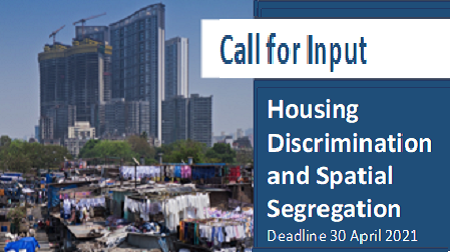CSO Consultation with UN Special Rapporteur on Housing
Discrimination and Spatial Segregation
Public consultation by the Special Rapporteur on the right to adequate housing with civil society organizations
Monday, 12 April 2021, 15:00–16:30 CET
Objective
The purpose of this public consultation is to collect input and recommendations from Civil Society Organizations in preparation for the Rapporteur’s next report to the General Assembly which will focus on the issues racial, caste, gender and other discrimination in relation to the right to adequate housing, including spatial inequalities and segregation in urban, rural and urban-rural environments. Additional webinars will be held by the UN Special Rapporteur with State representatives, local governments, lawyers, non-discrimination bodies, national and regional human rights institutions and representatives of the judiciary during April 2021.
Agenda
Opening Remarks
- Special Rapporteur on the right to adequate housing, Mr. Balakrishnan Rajagopal
Short Interventions
- Expert facilitator
Closing Remarks
Discussion
Registration
Please register by 11 April 2021 at the following link: https://docs.google.com/forms/d/1kiFPT3xx4CrVEriK0xElza3g5bizjExSh-FZnLZLiOk/edit?usp=sharing
The meeting link will be sent two hours before the start of the meeting to registered participants.
Background
Discrimination, based on race, caste, gender, ethnicity, income status and other forms of discrimination, remains one of the biggest barriers to the equal enjoyment of the right to adequate housing across the globe. The impact on affected communities takes hold not only at a household level but also drives patterns of segregation that shape inequalities at community and city-wide scales, inequities that ultimately infringe the equal enjoyment of several human rights in our cities and territories.
In light of the urgency of these issues, the next thematic reports of the Special Rapporteur on the right to adequate housing to the General Assembly in 2021 and to the Human Rights Council in 2022 will focus on the issue of discrimination in relation to the right to adequate housing, including the impact of spatial segregation in urban or rural-urban environments on the enjoyment of human rights.
Spatial segregation can be understood as the imposed or preferred separation of groups of people in a particular territory by lines of race, caste, ethnicity, language, religion or income status. Spatial, including residential segregation can have different forms depending on the territorial, cultural or historical context and is often characterized by forms of economic and social exclusion, inequity and spatial disparity in access to infrastructure, services and livelihood opportunities.
Discrimination is defined under human rights law as any formal or substantive distinction, exclusion, restriction, preference or other differential treatment that is directly or indirectly based on the prohibited grounds of discrimination as to race, colour, sex, language, religion, national or social origin, political or other opinion, property, birth or other status - including disability, age, nationality, marital and family status, sexual orientation and gender identity, health status, place of residence, economic and social status - which has the intention or effect of nullifying or impairing the recognition, enjoyment or exercise, on an equal footing, of human rights.
The main objective of the two interrelated reports will be to identify contemporary and historical forms of discrimination and segregation that affect the right to adequate housing, to highlight good practices in the prevention of discrimination and segregation and to provide guidance to States on how they can ensure their human rights obligations in relation to non-discrimination and the right to adequate housing. The reports will contain medium and long-term recommendations to States, local and regional Governments and other actors for eliminating housing discrimination and addressing spatial segregation and its adverse human rights impacts.
Civil society representatives and other actors are as well strongly encouraged to submit information in writing.
More information, including a questionnaire in English | Français | Español to assist collecting information is available here.
Deadline for Written submissions to be considered for the report to the General Assembly is 30 April 2021.
Key topics to be discussed
- What are the principal forms of discrimination or barriers toward equal enjoyment of the right to adequate housing faced by historically marginalized groups in your country (in urban, rural and urban-rural contexts)?
- What patterns and practices of segregation in urban, rural and peri-urban contexts are observed in your country? What are the principal impacts of spatial inequality and segregation on affected communities?
- What policies, measures or other practices do you consider most important to address housing discrimination and spatial segregation?














